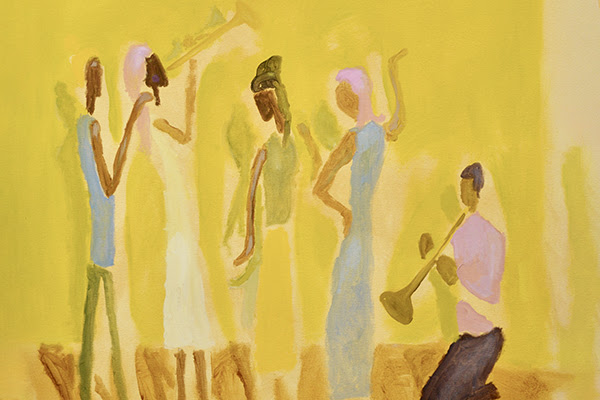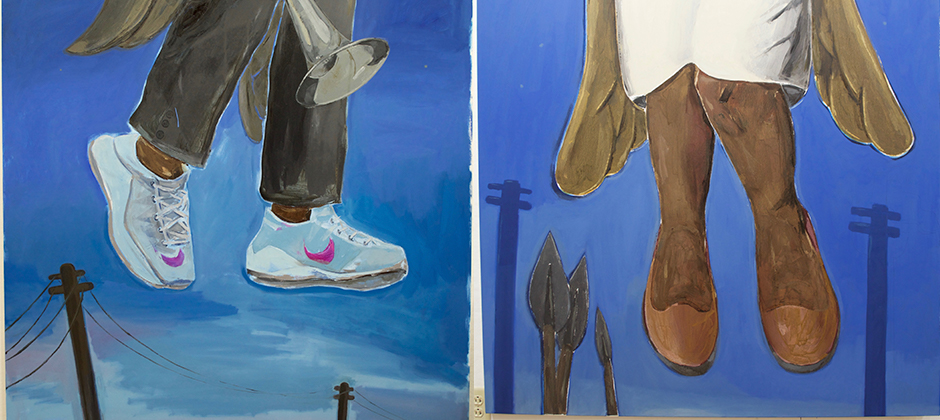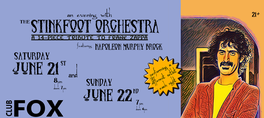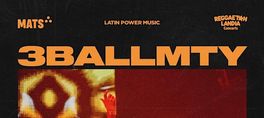Stanford Live and the Hopkins Center for the Arts at Dartmouth College have commissioned this new collaboration by Stanford faculty composer Jonathan Berger, librettist Vievee Francis, and visual artist Enrico Riley, directed by Niegel Smith. A reflection on the murder of Eric Garner and the legacy of police brutality, The Ritual of Breath Is the Rite to Resist is rooted in seven poetic movements and scored for soprano (Neema Bickersteth), tenor saxophone (Greg Ward), and chamber ensemble, and features dance, immersive projections, and a local chorus. An opera, a participatory action, and a community ritual, this bold activist opera invites audiences to rise up against the theft of Black breath, to meditate on our shared humanity, and to join in the agency of shared resistance.
"When my Dartmouth colleague Mary Lou Aleskie reached out to me about this project nearly five years ago, we knew we had to be involved," says Chris Lorway, Stanford Live's Executive Director. "It has provided an important opportunity for both of our campuses to work with an incredible roster of artists whose healing work has only become more urgent over the past couple of years."
With Berger's score and Riley's paintings and drawings depicting Black life, the opera follows the protagonist Erica as she grieves the loss of her father to police violence and encourages her community to engage in rituals of healing. By revealing the ways in which police violence impacts Black and brown communities, The Ritual of Breath Is the Rite to Resist builds a shared experience for the audience, evoking empathy while also urging the audience to engage in activism beyond what happens on stage.
"Ritual of Breath will be an undertaking that involves spiritual practice and community engagement," says Dr. Kimberly Thomas McNair, Stanford Lecturer in African and African American Studies and creative producer for engagement for the Ritual of Breath performances at Stanford Live. "Though this stage production focuses on incidents that are specific to New York, police brutality is also a longstanding issue in the Bay Area."
"Historically, Bay Area community organizations such as the Black Panther Party initiated community programs and citizen patrols to counter police violence toward the Black community," says McNair, who is engaging communities and organizations in the Bay Area that are working to address police violence. "And the broader Movement for Black Lives has built a network of community organizations that serve as a support system for affected families, with some of the most influential organizations originating here in the Bay Area."
Artwork by Enrico Riley
show less
"When my Dartmouth colleague Mary Lou Aleskie reached out to me about this project nearly five years ago, we knew we had to be involved," says Chris Lorway, Stanford Live's Executive Director. "It has provided an important opportunity for both of our campuses to work with an incredible roster of artists whose healing work has only become more urgent over the past couple of years."
With Berger's score and Riley's paintings and drawings depicting Black life, the opera follows the protagonist Erica as she grieves the loss of her father to police violence and encourages her community to engage in rituals of healing. By revealing the ways in which police violence impacts Black and brown communities, The Ritual of Breath Is the Rite to Resist builds a shared experience for the audience, evoking empathy while also urging the audience to engage in activism beyond what happens on stage.
"Ritual of Breath will be an undertaking that involves spiritual practice and community engagement," says Dr. Kimberly Thomas McNair, Stanford Lecturer in African and African American Studies and creative producer for engagement for the Ritual of Breath performances at Stanford Live. "Though this stage production focuses on incidents that are specific to New York, police brutality is also a longstanding issue in the Bay Area."
"Historically, Bay Area community organizations such as the Black Panther Party initiated community programs and citizen patrols to counter police violence toward the Black community," says McNair, who is engaging communities and organizations in the Bay Area that are working to address police violence. "And the broader Movement for Black Lives has built a network of community organizations that serve as a support system for affected families, with some of the most influential organizations originating here in the Bay Area."
Artwork by Enrico Riley
Stanford Live and the Hopkins Center for the Arts at Dartmouth College have commissioned this new collaboration by Stanford faculty composer Jonathan Berger, librettist Vievee Francis, and visual artist Enrico Riley, directed by Niegel Smith. A reflection on the murder of Eric Garner and the legacy of police brutality, The Ritual of Breath Is the Rite to Resist is rooted in seven poetic movements and scored for soprano (Neema Bickersteth), tenor saxophone (Greg Ward), and chamber ensemble, and features dance, immersive projections, and a local chorus. An opera, a participatory action, and a community ritual, this bold activist opera invites audiences to rise up against the theft of Black breath, to meditate on our shared humanity, and to join in the agency of shared resistance.
"When my Dartmouth colleague Mary Lou Aleskie reached out to me about this project nearly five years ago, we knew we had to be involved," says Chris Lorway, Stanford Live's Executive Director. "It has provided an important opportunity for both of our campuses to work with an incredible roster of artists whose healing work has only become more urgent over the past couple of years."
With Berger's score and Riley's paintings and drawings depicting Black life, the opera follows the protagonist Erica as she grieves the loss of her father to police violence and encourages her community to engage in rituals of healing. By revealing the ways in which police violence impacts Black and brown communities, The Ritual of Breath Is the Rite to Resist builds a shared experience for the audience, evoking empathy while also urging the audience to engage in activism beyond what happens on stage.
"Ritual of Breath will be an undertaking that involves spiritual practice and community engagement," says Dr. Kimberly Thomas McNair, Stanford Lecturer in African and African American Studies and creative producer for engagement for the Ritual of Breath performances at Stanford Live. "Though this stage production focuses on incidents that are specific to New York, police brutality is also a longstanding issue in the Bay Area."
"Historically, Bay Area community organizations such as the Black Panther Party initiated community programs and citizen patrols to counter police violence toward the Black community," says McNair, who is engaging communities and organizations in the Bay Area that are working to address police violence. "And the broader Movement for Black Lives has built a network of community organizations that serve as a support system for affected families, with some of the most influential organizations originating here in the Bay Area."
Artwork by Enrico Riley
read more
"When my Dartmouth colleague Mary Lou Aleskie reached out to me about this project nearly five years ago, we knew we had to be involved," says Chris Lorway, Stanford Live's Executive Director. "It has provided an important opportunity for both of our campuses to work with an incredible roster of artists whose healing work has only become more urgent over the past couple of years."
With Berger's score and Riley's paintings and drawings depicting Black life, the opera follows the protagonist Erica as she grieves the loss of her father to police violence and encourages her community to engage in rituals of healing. By revealing the ways in which police violence impacts Black and brown communities, The Ritual of Breath Is the Rite to Resist builds a shared experience for the audience, evoking empathy while also urging the audience to engage in activism beyond what happens on stage.
"Ritual of Breath will be an undertaking that involves spiritual practice and community engagement," says Dr. Kimberly Thomas McNair, Stanford Lecturer in African and African American Studies and creative producer for engagement for the Ritual of Breath performances at Stanford Live. "Though this stage production focuses on incidents that are specific to New York, police brutality is also a longstanding issue in the Bay Area."
"Historically, Bay Area community organizations such as the Black Panther Party initiated community programs and citizen patrols to counter police violence toward the Black community," says McNair, who is engaging communities and organizations in the Bay Area that are working to address police violence. "And the broader Movement for Black Lives has built a network of community organizations that serve as a support system for affected families, with some of the most influential organizations originating here in the Bay Area."
Artwork by Enrico Riley
show less
Date/Times:
327 Lasuen Street, Palo Alto, CA 94025
The Best Events
Every Week in Your Inbox
From Our Sponsors
UPCOMING EVENTS
Great suggestion! We'll be in touch.
Event reviewed successfully.










